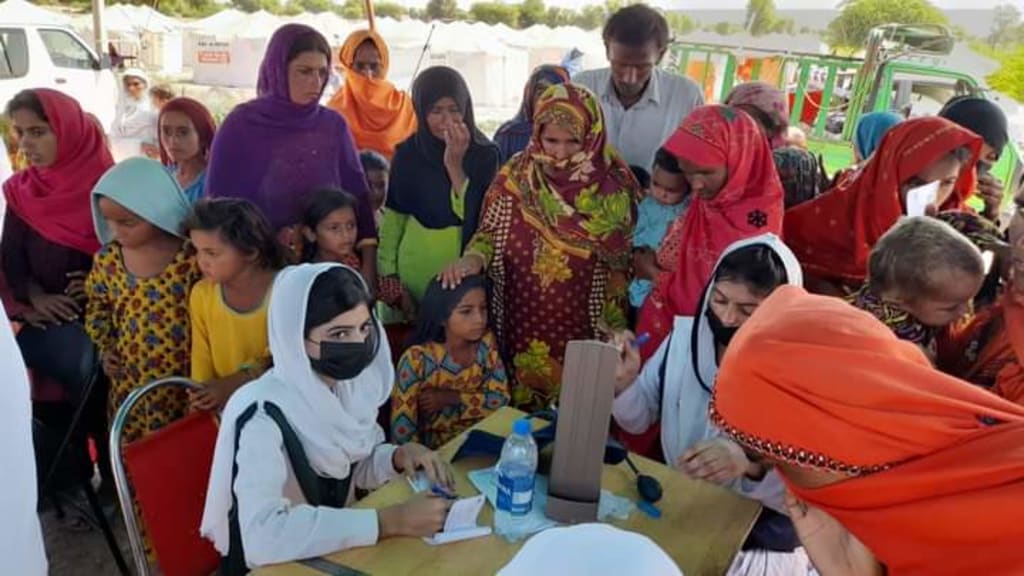Empowering Women's Menstrual Health: A Shared Responsibility
"The Crucial Role of Husbands, Mothers, and Female NGOs in Promoting Education, Awareness, and Access to Mental Health Resources"

Women have been facing various challenges throughout history, and one of the most misunderstood and stigmatized challenges they experience is menstruation. It's important to recognize that menstruation is not just a physical experience for women, but also a deeply personal and emotional one. The hormonal changes that occur during a menstrual cycle can have a significant impact on a woman's mood, causing feelings of irritability, anxiety, and depression. Additionally, the societal stigma surrounding menstruation can leave women feeling isolated and ashamed, further exacerbating their emotional struggles. It's crucial that we as human can help out women by creating a safe and supportive environment for women where they can openly and easily discuss their menstrual cycle and receive the support they need. By promoting education and awareness about menstruation, we can help out them to break down the stigma and provide women with the tools to manage their physical and emotional health. By doing so, we can help women feel more comfortable and confident during their menstrual cycle and promote greater gender equality.
Menstrual cycle is a hormonal process that occurs in women, and it usually lasts for 28 days. During this time, the body undergoes various changes that prepare it for pregnancy. These changes are controlled by hormones such as estrogen and progesterone. However, the hormonal fluctuations during the menstrual cycle can also have significant psychological implications.
One of the most common psychological challenges that women face during their menstrual cycle is premenstrual syndrome (PMS). PMS is a condition that affects many women and is characterized by physical and psychological symptoms that occur during the phase of the menstrual cycle. The symptoms of PMS can include mood swings, anxiety, depression, irritability, and fatigue. These symptoms can be severe enough to affect the quality of life for women and can even interfere with their ability to work and perform daily activities. When women are going through menstruation, they require the support and understanding of their colleagues at work and their family members at home. Failing to acknowledge and address their needs during this time is akin to abandoning them to deal with these challenges alone.
Another psychological problem that women may experience during their menstrual cycle is premenstrual dysphonic disorder (PMDD). PMDD is a severe form of PMS that affects around 3-8% of women. The symptoms of PMDD can include severe depression, anxiety, and irritability, which can significantly impact a woman's ability to function. Women with PMDD may also experience physical symptoms such as headaches and joint pain.
Furthermore, menstrual-related mood disorders are also prevalent among women. These disorders can occur at any time during the menstrual cycle and can be characterized by symptoms such as depression, anxiety, and mood swings. These disorders can be severe and may require treatment, such as medication or therapy.
One of the significant factors that contribute to the psychological problems that women face during their menstrual cycle is the cultural stigma and shame surrounding menstruation. In some cultures, menstruation is considered impure, and women are seen as dirty and unclean during their menstrual cycle. This can lead to women feeling ashamed or embarrassed about their menstrual cycle, and they may hide it from others. In some cultures, women are not allowed to pray while they are menstruating, and often they are expected to hide this natural process from their elder brothers or elderly members of the society due to fear and shame. This silence can prevent them from receiving the necessary support and help they need to manage pain or problems during their menstrual cycle. We need to break the taboo and create a safe and supportive environment where women can share their experiences without fear of judgment or shame. Moreover, the societal expectations and gender roles that women are expected to perform can also contribute to their psychological problems during the menstrual cycle. Women are often expected to be nurturing, caring, and emotional, and these expectations can create a sense of pressure and stress. Women may feel like they need to hide their emotions during their menstrual cycle, which can lead to feelings of isolation and loneliness. The hormonal changes that occur during the menstrual cycle can also affect women's cognitive functioning. Women may experience memory and concentration problems, which can impact their ability to work and perform daily activities. The hormonal changes can also affect women's sleep patterns, leading to insomnia and other sleep disorders. In many countries, women face the challenge of not having access to essential menstrual products, especially during chaotic conditions caused by man-made or natural disasters. This can leave them feeling helpless and traumatized, as they resort to unhygienic methods that can lead to infections and health problems. Addressing menstrual health as a humanitarian crisis is crucial to ensure women have access to sanitary products, protecting their health and dignity in times of emergency.
There are several effective strategies that women can use to manage their psychological challenges during their menstrual cycle. One such strategy is exercise, which can help reduce stress. In addition to this, it is crucial to have small guidance and counseling units in areas where women face more psychological problems. These units can provide emotional support to women who cannot openly discuss their issues with their family members. It is important to have these units specifically for the ladies of the family, to ensure they are supportive during these special days and promote women's psychological well-being.
It is the prime responsibility of husbands to understand and support their wives during their menstrual cycle, while for young unmarried girls; it falls on their mothers and elder sisters to guide them. During times of natural disasters, female NGOs should step forward to address the menstrual health needs of women. It is crucial to recognize and address these issues to ensure that women receive the support and resources they need to manage their menstrual cycle with dignity and respect. This includes promoting education and awareness about menstrual health, as well as providing access to mental health resources and support. A healthy society can only be achieved by keeping women healthy and strong, both mentally and physically, and by addressing their menstrual health needs in the society they live in.
About the Creator
Azra Yasmeen
i am a female educationist who wants to write about strength of women and about their rights as well.
Enjoyed the story? Support the Creator.
Subscribe for free to receive all their stories in your feed. You could also pledge your support or give them a one-off tip, letting them know you appreciate their work.





Comments (2)
informative
really informative and good information to help out women.